
Types of Hair and Scalp Problems
Alopecia Areata is an auto immune disorder that usually affects the scalp but can spread all over the body. It only affects hair and is characterized by patchy coin-sized bald spots that appear suddenly. These spots can keep growing in size and number all over the scalp.
Alopecia Areata is a type of non-scarring alopecia that affects both men and women. Studies have shown that it is caused by abnormalities in the immune system; for instance, a misguided immune system that tends to attack its own body. In Alopecia Areata, because of stress, there is an abnormal immune response which attacks the hair follicles and disrupts normal hair growth.
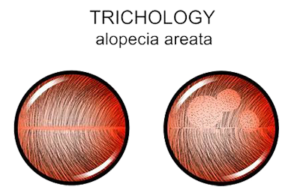
The bald patches usually grow back after 6-9 months, but in some cases it may take longer. Seeking a Trichologist’s help as early as possible can help in controlling frequent attacks of Alopecia Areata.
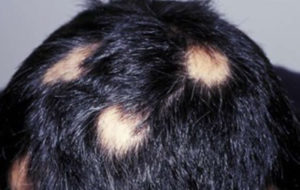
Dandruff is a harmless chronic scalp condition characterised by dry and scaly flakes causing itchiness. It is mainly caused due to fungus called malassezia or a weak immune system. Over- production of sebum can also cause dandruff. It has nothing to do with hygiene but it can become worse in individuals who do not wash and brush their scalp regularly.
Dandruff can be just a symptom of other scalp diseases such as:-
- Seborrheic dermatitis
- Eczema
- Psoriasis
- Tinea capitis
- Unhealthy lifestyle – lack of nutrition
- Weak immune system
- Stress
It is non- communicable but can be embarrassing as the flakes keep dropping on the shoulder and itchiness can be unbearable. Dandruff can be controlled by using shampoos that contain the following ingredients such as :- Ketoconazole, Zinc pyrithione, coal tar shampoo, salicylic acid and selenium sulphide.
It is particularly important to leave in the shampoo for at least 5- 7 mins while washing as it softens the flakes and helps in faster removal. A trichologist can help you in finding the root cause of dandruff and customise treatments accordingly.
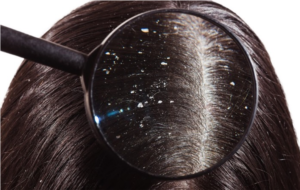
The human endocrine system releases hormones according to physiological needs to regulate the complex metabolic activities that take place in our body. The human endocrine system is mainly made up of 3 hormone axis systems such as the Gonadal axis, Adrenal axis and Thyroid axis. The type of hair loss closely related to the hormonal system is known as Androgenetic Alopecia. It is characterised by gradual receding hairline followed by slow disappearance of hair from the crown and the frontal area of the scalp.
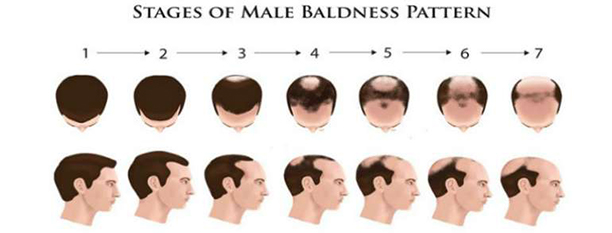
It is primarily a result of excess male hormone (Testosterone). The enzyme 5 alpha reductase converts testosterone to DHT. (Di Hydro Testosterone) DHT binds to androgen receptors on the oil glands resulting in excessive stimulation of the oil glands and affects the metabolism of follicle health, DHT makes the follicle weak and prevents proteins, vitamins and minerals from providing the required nourishment to sustain life in the hair follicles.
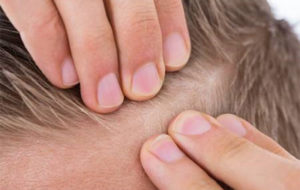
The result is either shortened growth phase (anagen) or extended resting phase (telogen). DHT also causes miniaturisation of the hair follicles resulting in the hair follicles eventually falling off.
A Trichologist can easily identify male and female pattern hair loss due to DHT and ‘stage it’ appropriately with a trichoscope. The technique can help analyse and foretell possible hair loss before it actually occurs.
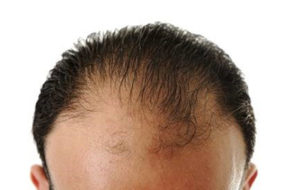
Eczema refers to a chronic inflammatory skin problem causing redness, itchiness and formation of dry flakes. In Singapore, roughly 1 in 18 people suffer from Eczema, with higher prevalence in young children and infants. The exact cause of this condition is not known yet but it seems to be greatly linked to genetics and overactive immune system. The triggering point can vary greatly in individuals and it can worsen their condition. It is very important to avoid these flare-ups by preventing the triggers.
Some of the common triggers of Eczema include :-
- Eggs
- Seafood
- Soy products
- Cosmetics
- Dust mites and pollen
- Hormonal changes
- Stress
- Chemical treatments, regular colouring and bleaching
- Pregnancy
There is no cure for eczema but an expert Trichologist can help you by advising the right treatment.
It is very important to keep the hair and skin moisturised as all times. Fragrance and alcohol free shampoos are recommended for daily use. Alpha Hydroxy Acid is the main ingredient used to lock in the moisture and keep the scalp hydrated at all times.
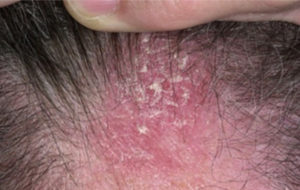
Greying hair is an inevitable sign of ageing. With age, hair follicles produce less melanin – the pigment responsible for hair colour. Genetics, hormonal factors, diet and stress can all contribute to premature greying.
According to clinical research, most men will develop grey hair by the age of 50. Genetics play a huge role in the development of grey hair. Even teens and young adults can go grey, as premature ageing is a largely genetic condition. Race and ethnicity also play a role – for instance, Caucasian men tend to go grey sooner. Stress, anxiety, lifestyle and medical factors can also accelerate the ageing process and this also contributes to the development of grey hair.
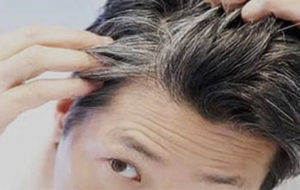
Hair loss is also know as Alopecia. Genetics, hormonal changes, stress, poor diet, lifestyle, age as well as medical conditions can all contribute to hair loss. Hair loss occurs as a result of disruption to the hair growth cycle where the hair follicles become weak and fall off. There is lack of blood supply and nutrients to the hair and causes excessive falling of hair. In most of these cases the hair follicle is still intact and once the root cause is treated, the hair can grow back. It is normal to lose up to 100 hairs a day but excessive hair loss is the first warning sign of a serious hair loss condition.
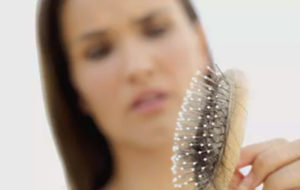
People with oily skin types are more likely to have oily scalps, possibly with acne as well. Oily scalps occur as a result of the excess sebum produced by overactive sebaceous glands which attract dirt and germs to the scalp, irritating it and making it feel itchy. Besides environmental factors such as humidity, poor scalp hygiene and wrong products can also contribute to this.
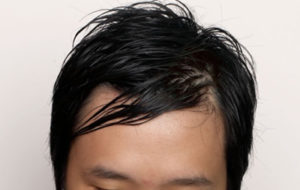
Pregnancy can be a roller coaster ride for every women as no two pregnancies are alike. However, one of the best thing that happen during pregnancy along with the baby is, glowing skin and thick shiny hair. This is due to the elevated oestrogen level during pregnancy as hair follicles enter the growth phase (anagen) and very few are in resting phase (telogen). During pregnancy stage, pregnant women have very few hair falling out but in post- pregnancy, as the oestrogen level falls, the hair starts dropping at an alarming speed too. Most women complain of seeing clumps of hair falling out during shampooing and brushing. The additional stress and responsibilities with the new baby only make it worse. It is important to understand that hair fall is a natural phenomenon and this is due to the change in your hormones. A Trichologist can help in counselling and recommending products that can make hair look fuller. Though there are numerous volumizing shampoos available, it may not be suitable for your scalp. Your Trichologist can recommend the right shampoo and tonic after a thorough examination of your scalp. Good advice and a great haircut will do wonders in managing post pregnancy hair loss.
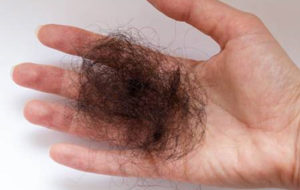
Scalp psoriasis is an auto-immune disorder that causes red, itchy, thick scales.These scales are referred to as plaques which usually occurs on elbow, knee, scalp, ears, lower back, legs, palm and soles of the feet and nails. When one attempt to peel off these plaques, it can be painful and cause bleeding. The overactive T cells in the immune system start attacking the healthy skin cells which causes rapid formation of dead skin cells. There is persistent build up of dead skin forming thick silvery flakes.
The exact cause of Psoriasis is unknown but it can be triggered due to :-
- Genetics
- Stress
- Infections
- Skin Injury
- Weak immunity
- Unhealthy lifestyle
- Smoking
- Alcohol
Psoriasis can range from mild to very severe and intense itching can make it worse. There is no cure for psoriasis and the problem can be very difficult to control. However, regular and persistent treatment can help alleviate the symptoms.
This is a serious condition and requires immediate attention and regular trichological supervision in scalp psoriasis. In extreme cases, psoriasis can lead to severe hair loss and balding. Shampoos containing coal tar and salicylic acid maybe used for removing regular build-up of dead skin on the scalp. Herbs such as Aloe vera and Alpha hydroxy acid is known to soothe psoriasis and prevent it from worsening.
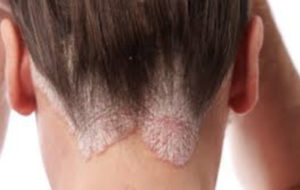
At any given time, about 85 – 90% of the hair on a person’s scalp should be in growth stage. Each follicle has its own life cycle that can be influenced by age, disease, and a wide variety of other factors. To solve the thinning problem, it is important to understand the cause first.
There can be numerous factors contributing to thinning such as :
- Stress
- Lack of sleep
- Dandruff
- Chemical treatments
- Strict Dieting
- Hormone imbalance
- Post-pregnancy hair loss
- Post-menopause hair loss
- Auto-immune disorders
- Age-related hair loss
- Genetics
- Surgery
- Infections
- Oral contraceptive pills
- Chemotherapy
Hair thinning follows a typical pattern in men, starting in the early thirties. Hair typically starts thinning from the temporal area and men often complain of a receding hairline. The crown area also starts thinning progressively, forming a horseshoe-shaped pattern that leaves the head exposed. Conversely, hair thinning for females start from the parting area and spreads towards the crown and temporal area.
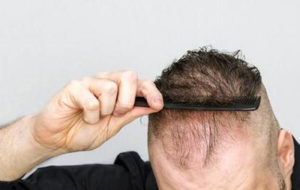
A Trichologist can help you in identifying the root cause of your hair thinning and customise treatment accordingly. Hair thinning can be controlled using natural herbs if it occurs at a very early age. Seeking treatment early can sometimes even reverse the condition.
Thyroid gland is an endocrine gland located on the front of the neck. Thyroid gland is responsible for growth and metabolism. Thyroid activity affects oxygen intake and distribution, energy production, protein synthesis and overall development and growth of the body.
The thyroid gland produces 2 main hormones:- thyronine and thyroxine.
The effect of the thyroid hormone activity on hair follicle is most notable during any fluctuation in these two hormones.
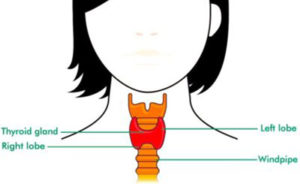
Thyroid disorder:
Thyroid disorder can cause numerous diseases but it can be broadly classified into two types – hyperthyroidism & hypothyroidism.
Hyperthyroidism:
It is the medical condition also known as Grave’s disease which occurs when the thyroid gland produces excessive hormones; which exceeds the requirement of the body.
Symptoms:
- Increased heart rate and palpitations
- Weight loss
- Intolerable to weather changes such as heat
- Nervousness and anxiety issues
- Increased metabolism
- Disturbed sleep cycle
- Hair loss
How Does It Affect Your Hair?
Your hair is extremely sensitive to any hormonal change in the body – as it is a reflection of your current state of health so if there is a problem of deficiency or excess production of thyroid hormone, your hair will be affected.
Hair follicle needs oxygen, blood supply and energy for proper hair growth. Due to the fluctuation in the thyroid hormone, hair follicle is unable to get sufficient oxygen and blood supply resulting in disturbed hair cycles. With disturbed hair cycle, telogen effluvium kicks in causing excessive shedding of hair affecting the entire scalp rather than discrete areas. The hair appears uniformly sparse and it can only to controlled once thyroid hormone is regulated.
Treatment:
- A thorough health check is a must to ensure the right dosage of thyroid medication.
- Reduction in intake of caffeine and sugar, including refined carbohydrates. Increase your protein intake and focus on eating real, whole foods rich in the nutrients needed for thyroid health, including iodine, selenium, zinc, iron, vitamin D, B vitamins, and vitamin A.
- Ensure you do a gut check-up as 20% of thyroid function depends on a sufficient supply of healthy gut flora, so it’s best to supplement with probiotics (friendly intestinal bacteria).
- Make lifestyle changes. Reduce stress and practice relaxation.
- To reduce hair fall, consume enough omega 3 fatty acids and protein rich diet.
- Regular scalp treatments using herbal remedies help in providing nutrition to your hair follicles and improve blood circulation towards your scalp which can help in reduction of hair fall.
- Choosing the right kind of shampoo suited to your hair and scalp condition and to avoid over-colouring of your hair or using too much hair spray and dyes.
- During regrowth, you may notice changes in texture of your hair which is absolutely normal. With regular hair and scalp treatments you will notice improvement.

